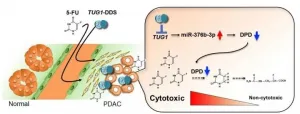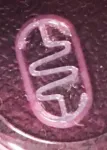Improving survival in pancreatic cancer
Suppressing a gene regulator could reduce pancreatic cancer resistance to vital chemotherapeutic treatment.
2021-04-22
(Press-News.org) Nagoya University researchers and colleagues in Japan have uncovered a molecular pathway that enhances chemotherapy resistance in some pancreatic cancer patients. Targeting an RNA to interrupt its activity could improve patient response to therapy and increase their overall survival.
"Pancreatic cancer is one of the most aggressive human malignancies, with an overall median survival that is less than five months," says cancer biologist Yutaka Kondo of Nagoya University Graduate School of Medicine. "This poor prognosis is partially due to a lack of potent therapeutic strategies against pancreatic cancer, so more effective treatments are urgently needed."
Kondo and his colleagues focused their attention on a long noncoding RNA (lncRNA) called taurine upregulating gene 1 (TUG1). lncRNAs are gene regulators, several of which have recently been identified for helping some cancers resist chemotherapy. TUG1 is already known for being overexpressed in gastrointestinal cancers that have poor prognosis and are resistant to chemotherapy.
The researchers found TUG1 was overexpressed in a group of patients with pancreatic ductal adenocarcinoma. These patients were resistant to the standard chemotherapy treatment 5-fluorouracil (5-FU), and died much sooner compared to cancer patients with low TUG1 expression levels.
Further laboratory tests showed TUG1 counteracts a specific microRNA, leading to increased activity of an enzyme, called dihydropyrimidine dehydrogenase, which breaks down 5-FU into a compound that can't kill cancer cells.
Kondo and his team found they could suppress TUG1 during 5-FU treatment of mice with pancreatic cancer by using antisense oligonucleotides attached to a specially designed cancer-targeting drug delivery system. Antisense oligonucleotides interfere with gene expression.
"Our data provides evidence that our therapeutic approach against pancreatic cancer could be promising," says Kondo.
The team now plans to conduct further laboratory investigations to test the effectiveness of their therapeutic strategy.
INFORMATION:
Their study, "Cancer-specific targeting of taurine upregulated gene 1 enhances the effects of chemotherapy in pancreatic cancer," was published online in the journal Cancer Research on March 1, 2021 at DOI: 10.1158/0008-5472.CAN-20-3021.
Authors:
Yoshihiko Tasaki, Miho Suzuki, Keisuke Katsushima, Keiko Shinjo, Kenta Iijima, Yoshiteru Murofushi, Aya Naiki Ito, Kazuki Hayashi, Chenjie Qiu, Akiko Takahashi, Yoko Tanaka, Tokuichi Kawaguchi, Minoru Sugawara, Tomoya Kataoka, Mitsuru Naito, Kanjiro Miyata, Kazunori Kataoka, Tetsuo Noda, Wentao Gao, Hiromi Kataoka, Satoru Takahashi, Kazunori Kimura, and Yutaka Kondo
About Nagoya University, Japan
Nagoya University has a history of about 150 years, with its roots in a temporary medical school and hospital established in 1871, and was formally instituted as the last Imperial University of Japan in 1939. Although modest in size compared to the largest universities in Japan, Nagoya University has been pursuing excellence since its founding. Six of the 18 Japanese Nobel Prize-winners since 2000 did all or part of their Nobel Prize-winning work at Nagoya University: four in Physics - Toshihide Maskawa and Makoto Kobayashi in 2008, and Isamu Akasaki and Hiroshi Amano in 2014; and two in Chemistry - Ryoji Noyori in 2001 and Osamu Shimomura in 2008. In mathematics, Shigefumi Mori did his Fields Medal-winning work at the University. A number of other important discoveries have also been made at the University, including the Okazaki DNA Fragments by Reiji and Tsuneko Okazaki in the 1960s; and depletion forces by Sho Asakura and Fumio Oosawa in 1954.
Website: http://en.nagoya-u.ac.jp/
[Attachments] See images for this press release:

ELSE PRESS RELEASES FROM THIS DATE:
2021-04-22
Robotics field aims at mimicking what natural biological entities have achieved throughout millennia of evolution - actions like moving, adapting to the environment, or sensing. Beyond traditional rigid robots, the field of soft robotics has recently emerged using compliant, flexible materials capable to adapt to their environment more efficiently than rigid ones. With this goal in mind, scientists have been working for years in the so-called biohybrid robots or biobots, generally composed of muscle tissue, either cardiac or skeletal, and an artificial scaffold, achieving crawling, ...
2021-04-22
Vigorous and rapid air exchanges might not always be a good thing when it comes to addressing levels of coronavirus particles in a multiroom building, according to a new modeling study.
The study suggests that, in a multiroom building, rapid air exchanges can spread the virus rapidly from the source room into other rooms at high concentrations. Particle levels spike in adjacent rooms within 30 minutes and can remain elevated for up to approximately 90 minutes.
The findings, published online in final form April 15 in the journal Building and Environment, come from a team of researchers at the U.S. Department of Energy's Pacific Northwest National Laboratory. The team includes building and HVAC experts ...
2021-04-22
Diseases continue to be a major threat to coral reef health. For example, a relatively recent outbreak termed stony coral tissue loss disease is an apparently infectious waterborne disease known to affect at least 20 stony coral species. First discovered in 2014 in Miami-Dade County, the disease has since spread throughout the majority of the Florida's Coral Reef and into multiple countries and territories in the Caribbean. Some reefs of the northern section of Florida's Coral Reef are experiencing as much as a 60 percent loss of living coral tissue area.
A new study by researchers at Florida Atlantic University's Harbor ...
2021-04-22
INDIANAPOLIS -- A team from Regenstrief Institute leveraged OpenMRS, a global open-source electronic medical record (EMR), to create an emergency EMR for Indianapolis first responders preparing for a possible influx of COVID-19 patients. This process was completed in a week to allow Indianapolis Emergency Medical Services (IEMS) to register patients, collect basic clinical information, and send these encounters to Indiana's health information exchange, a crucial element to help the response to the COVID-19 pandemic.
IEMS asked Regenstrief research scientists for help ...
2021-04-22
Invasive Group B Streptococcus (GBS) disease, notably meningitis, during the first days and months of a baby's life can have persistent effects for children and hence their families, according to new research. Published in the Lancet Child & Adolescent Health, the study is the first evidence of long-term effects including after GBS sepsis (infection in the bloodstream).
This large study analysed outcomes for nearly 25,000 children born in Denmark and The Netherlands, between 1997 and 2017. Results show that children who had invasive GBS infection are twice as likely to have neurodevelopmental impairments (NDI) and ...
2021-04-22
BOSTON - A unique antibody drug conjugate (ADC), which delivers a high dose of a cancer-killing drug to tumor cells through a targeted antibody, has been found in a global phase 3 clinical study to nearly double the survival time of patients with refractory metastatic triple-negative breast cancer. The study of the ADC drug sacituzumab govitecan (SG), for which Massachusetts General Hospital (MGH) was a lead clinical research site after serving as the lead site for the pivotal phase 1/2 trial, reported superior outcomes compared to single-agent chemotherapy, the standard for treating metastatic triple-negative breast cancer. The phase 3 results of the study, known as ASCENT, were published in the New England Journal of Medicine.
"Favorable results with SG versus chemotherapy were observed ...
2021-04-22
A new study has found up to half of all children with language difficulties and mental and physical health problems have been exposed to intimate partner violence, prompting calls for health and social care services to provide more effective identification and early intervention.
The research, led by the Murdoch Children's Research Institute (MCRI) and published in The BMJ, showed children exposed to intimate partner violence from infancy were twice as likely to have a psychiatric diagnosis, emotional and behavioural difficulties, and impaired language skills at age 10. They were also more likely to have asthma and sleep problems.
The study also found that ...
2021-04-21
MINNEAPOLIS - Intracerebral hemorrhage is a life-threatening type of stroke caused by bleeding within the brain tissue. Survivors are at high risk of having another bleeding stroke. Most of these strokes are caused by changes in the narrowest blood vessels in the brain, a condition known as cerebral small vessel disease. A new study has found that differences in the extent of one type of cerebral small vessel disease may contribute to differences in people's risk for a second bleeding stroke. The research is published in the April 21, 2021, online issue of Neurology®, the medical journal of the American Academy of Neurology.
Cerebral small vessel disease is an umbrella term for a number of conditions that involve changes in the smallest blood vessels in the ...
2021-04-21
MINNEAPOLIS - Women who have migraine before menopause may have an increased risk of developing high blood pressure after menopause, according to a study published in the April 21, 2021, online issue of Neurology®, the medical journal of the American Academy of Neurology.
"Migraine is a debilitating disorder, often resulting in multiple severe headaches a month, and typically experienced more often by women than men," said study author Gianluca Severi, Ph.D. of the French National Institute of Health and Medical Research in Paris. "Migraine is most prevalent in women in the years before menopause. After ...
2021-04-21
HERSHEY, Pa. -- Next time you make a salad, you might want to consider adding mushrooms to it. That's because higher mushroom consumption is associated with a lower risk of cancer, according to a new Penn State study, published on March 16 in Advances in Nutrition.
The systematic review and meta-analysis examined 17 cancer studies published from 1966 to 2020. Analyzing data from more than 19,500 cancer patients, researchers explored the relationship between mushroom consumption and cancer risk.
Mushrooms are rich in vitamins, nutrients and antioxidants. The team's findings show that these super foods may also help guard against cancer. Even though shiitake, oyster, ...
LAST 30 PRESS RELEASES:
[Press-News.org] Improving survival in pancreatic cancer
Suppressing a gene regulator could reduce pancreatic cancer resistance to vital chemotherapeutic treatment.




